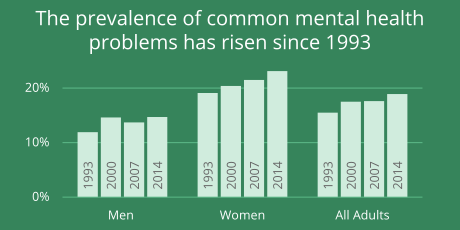
Social media is how the majority of people obtain news. Print journalism is slowly dying and although the online infosphere connects us more than ever before, it is a hotchpotch of fake news, fake people and fake feelings. Anyone can write a story, take a photo and post it online.
It’s becoming increasingly difficult to determine what is real and trustworthy anymore.
Time and time again, we see people - celebrities included - preach about the importance of mental health and speaking out; of reminding ourselves that Instagram is a highlight reel of people’s ‘best bits’ and that we are only seeing what they want us to see.
So why does it feel like mental health problems are only getting worse?
The UK Parliament’s ‘Mental health statistics for England’ published in January this year, detailed that the prevalence of mental health problems in the country had risen substantially since 1993. A 2017 survey of children and young people's mental health found that one in eight children aged five to 19 had at least one mental health problem.

(c) UK Parliament
In Northern Ireland the toll of deaths by suicide since the signing of the Good Friday Agreement is larger than the amount of people killed during the Troubles.
Are the numbers rising because as a society we are more open to admitting that we are facing problems, or is social media part of the cause and correlation?
'Schadenfreude'
In 2013, a study by Princeton University researchers suggested that people are actually biologically responsive to taking pleasure in the pain of others, a reaction known scientifically as 'Schadenfreude.'
If this is true, perhaps people pointing fingers at the traditional tabloid media should wonder why certain publications post the adverse stories that they do. Celebrity gossip stories get millions of views; millions of clicks; millions of likes. It’s basic supply and demand.
Unfortunately, it’s a business.
This should not suggest that it is acceptable or justifiable, but as individuals we need to think about what we’re buying, reading and sharing. Could the cycle be stopped by simply ignoring or boycotting the content; by just avoiding the clickbait headlines and turning a blind eye to Schadenfreude?
In the recent Channel 4 documentary on the death of Stuart Lubbock in presenter Michael Barrymore’s pool in 2001, former News of the World journalist Paul McMullan disagrees that the truth was the most important thing during his reporting of the incident, “suggesting the story was more important than establishing the facts” as detailed in the Daily Mail.
 (c) Channel 4 - ex-News of the World reporter Paul McMullan left viewers "aghast" with some of his comments
(c) Channel 4 - ex-News of the World reporter Paul McMullan left viewers "aghast" with some of his comments
He stated that rarely did he care for anyone’s feelings. McMullan has since been slated by viewers on Twitter with many surprised at what can be perceived as a blatant lack of remorse.
Some may be shocked at his blunt honesty, but what about the millions of fake accounts that people hide behind online when making similar admissions or abhorrent statements?
According to Facebook’s Community Standards Enforcement Report, in May 2018 the site disabled around 800 million fake profile accounts. This isn’t even taking into consideration Instagram, Twitter and multiple other platforms.
Some Twitter users are calling for an identification process to be introduced, so that people have to provide their passport details before creating an account, in an effort to deter the use of fake profiles and hold people accountable for negative ‘trolling’ and cyber bullying.
Is the breaking of barriers between celebrites and the public positive?
Before the storm of social media, media psychologist Honey Langcaster-James told BBC Radio Ulster that if someone didn’t like something a celebrity did, there was no real instant way of that celebrity knowing that. Now, there is an online opinion overload, and people are constantly bombarded with comments – negative and positive – whether it’s warranted or not.
On the other end of the spectrum, former footballer and manager Kevin Keegan made reference in his autobiography to the fact that again, before social media, if a newspaper published a damaging or untrue story about a celebrity, they had no way of instantly responding to it – they would have to wait until their next media interview whereas now they can take to Twitter straight away to defend themselves.
Regardless, social media does not seem to be slowing down, and it will be here to stay in one way or another for a long time.
We also should not assume it is the only factor to play in the demise of anyone's personal mental health. Assumptions are not facts, and society as a whole could learn a lesson from the Samaritans' media guidelines: “Avoid speculation of causes or simplistic explanations - bear in mind that suicide is complex and seldom the result of a single factor, it is likely to have several inter-related causes.”
One thing we can be sure of - whether it’s empathy, sympathy, or just saying nothing if we have nothing good to say – as Caroline Flack posted on her Instagram amid being hounded by the press;
“In a world where you can be anything be kind.”